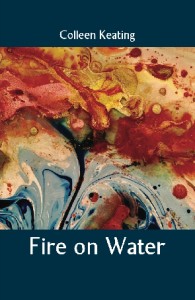
FIRE ON WATER
It is an honour to have Beverley George with us this afternoon.
Beverley is renowned nationally and internationally in the field of Japanese Poetry . She is a Writing Fellow of the Fellowship of Australian Writers and past editor of the journal Yellow Moon, the Society of Women Writers NSW Newsletter 2004-2006 and Eucalypt: a Tanka Journal which she edited for 10 years. Currently she edits Windfall: Australian Haiku .
How does one sum up such a body of work? How does one begin to speak about this talented writer, her achievements, publications and awards?
She was president of the Australian Haiku Society 2006-10 and has served as an international judge for Japanese poetic genre competitions in Japan , UK, US and Canada. Beverley has presented papers at two poetry conferences in Japan and has served as literary adviser to Mitsui Travel for six small group tours to Japan.
Beverley’s launch speech for “Fire on Water” by Colleen Keating
Welcome everybody and especial thank you to Colleen for inviting me to launch her lovely poetry collection: Fire on Water. An honour indeed.
The poetry in this book engages with so much that truly matters to the human heart and mind. Reading it, I am reminded of the words of the American poet Mary Oliver
“. . . For poems are not words, after all, but fires for the cold, ropes let down to the lost, something as necessary as bread in the pockets of the hungry.”
[― Mary Oliver, ‘A Poetry Handbook’]
Even when writing on complex subjects, Colleen speaks clearly, without artifice. She doesn’t use ‘clever’ words; she uses right words; those words that fit best with the ideas she presents to us. Much thought and care have gone into their selection.
Many of the poems are concerned with social justice: such as the plight of refugees, or aspects of indigenous history but the poet’s voice remains compassionate, not sentimental.
The book itself is physically attractive, easy to use and isn’t that imaginative cover illustration by Elizabeth Keating-Jones, Colleen’s daughter so appealing? I love it.
You will soon notice that the poems are pleasingly grouped although not strictly sequential within those groups. Advantages of this formatting are that the reader can consider aspects of a particular topic at one reading and choose another topic the next time one picks up the book. It also makes it easy to relocate poems for further contemplation; those that we have particularly read and enjoyed. What did Colleen write about downsizing? About refugees? About aspects of nature?
An extremely relevant section for me right now, and I would presume for some others in this room is that of downsizing; disposing of some possessions treasured for a life-time; selling the family home with all its treasured memories of loved family members and pets.
Of particular impact is the brief poem on p. 35 “where’s home, Ulysses”. Lines such as
“where there is a home
make a house depersonalise
the real estate agent says
ebay vinnies salvos
devour my story
on the footpath garbage pick-up
my life exposed”
clearly convey the loss of control, the loss of property, the uncertainty that too often accompanies this rite of passage.
But Colleen’s poems travel through this difficult period with honesty and directness and resolve into thoughts not of just acceptance but of positivity and optimism for what is now possible; what lies ahead.
What comes through clearly and consistently in Colleen’s work, is a strong sense of social justice; deep concern for the plight of those others helpless to improve their own lives.
A particularly powerful poem can be found on. p.75 ‘Stillborn’. Colleen writes of:
“people seeking asylum
returned to face those they flee
history like a drawbridge is pulled up
closed off
humanity is stillborn”
and concludes with the challenging lines
“the everywoman in me weeps […]
if you are not weeping
ask why”
You’ve probably all heard of the Roland Barthes’ theory that once a piece of writing is public the role of the reader becomes active, as they bring their own experience and knowledge to interpreting the text; an interplay between writer and reader results. This suggests we each may read a poem slightly differently and of course you will choose which parts of this book are most relevant and intriguing for you. And this is as it should be.
In a few moments we will have the pleasure of hearing Colleen read some of her own work. Here’s a little advance notice; something I am hoping Colleen might tell us more about. Her fascination with the woman musician, herbalist and healer, Hildegard of Bingen.
A rich source of pleasure in this book comes with Colleen’s approach to writing about nature. These poems are detailed and convincing. The poet is looking hard and appreciating the world around her.
Whether she is writing about a physical location such as The Entrance; plants such as sunflowers, or a felled tree; creatures like a wood pigeon, a dragonfly or a hawk, her words reach out to us; draw us in.
Again, thank you for coming. It is now my very great pleasure to announce Fire on Water by Colleen Keating launched and ready for sharing. We will now hear from the poet, herself…over to Colleen.
